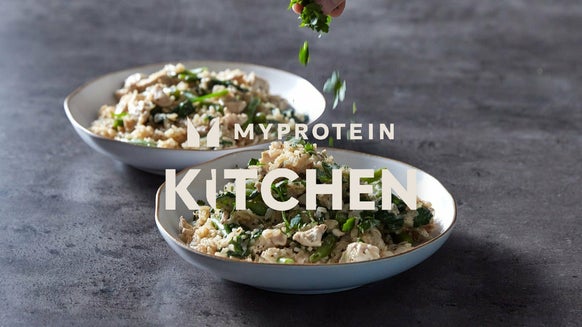Macro Calculator | How To Calculate Your Macros For Flexible Dieting & IIFYM


Picture this scenario, being able to eat a range of foods with no restriction that allows you to hit your goals whether it be building muscle, losing or maintaining weight. This sounds brilliant, doesn’t it? Well, look no further — our macro calculator enables you to calculate the perfect nutrition plan so you can prepare for success.
Flexible dieting or IIFYM (If it fits your macros) is a popular nutritional intervention designed to give you the ability to pick and choose what you wish to eat in order to avoid going below or above your calorie intake in a day. Its flexibility is great in that it gives you the ability to enjoy social situations without needing to restrict yourself from enjoying alcohol or specific food groups. This article will explain what macros are, calculate your maintenance calories, and both present to you how to adjust your calories for weight loss or weight gain as well as work out your macro needs for protein, fats, and carbohydrates.
- Macro calculator
- What are macros?
- Calculate maintenance calories
- Adjusting calories for weight loss or gain
- Working out protein
- Working out fat
- Working out carbohydrate
- What's IIFYM?
- FAQs
What are macros?
For those of you who are new to this, “macros” is short for “macronutrients”, the nutrients found in large quantities that give us energy. The three main macronutrients are fat, protein and carbohydrate. Avoid getting these confused with micronutrients which are vitamins and minerals found in food and consumed in small amounts.
Protein
Protein is essentially our body’s “building materials and structures”. From our skin to our organs, to our hair and muscle, protein constitutes the bulk of these structures. We get these building materials from our diet from the dietary protein we eat. Our body digests these protein containing foods and breaks down the protein provided into its own individual building blocks (amino acids). These building blocks are then used by our body to build new protein structures again or repair damaged ones (like when we cause muscle damage during training). This process of breaking down and repurposing is how we essentially grow our muscle (alongside the necessary stimulus like weight or resistance training).
How much protein do we need though? Well, government recommendations advise around 55g of protein a day for men and 45g a day for women. Now I know that doesn’t sound like a lot… because, well, it’s not. In fact, researchers suggest that both men and women should be at least aiming for 1.2g of protein per kg of bodyweight each day (which would eclipse these government recommendations)1,2.
Athletes may want to pay particular attention to this point; researchers have proposed that you may need as much as 1.6 to 2.2g of protein per kg of bodyweight per day1 to make up for all the added performance and recovery demands.
A protein powder supplement is a very useful means of achieving these higher targets as well as being way more cost and calorie efficient.

Myprotein's Best Whey Protein Flavours According To You
If you’ve ever found yourself in a protein-picking dilemma, a good place to start is what’s the most popular.
Carbohydrates
Carbohydrates or “carbs” aren’t the devil nor are they simply shuttled straight to your hips (despite what the internet gurus may tell you). Carbs are actually the body’s primary source of energy and, whilst they aren’t essential (because we can actually convert both protein and fats into carbohydrate, albeit not very efficiently), having an adequate supply of them in your diet may be more optimal for both your health, body composition and performance.
Many carbohydrate sources are rich in important health promoting nutrients (such as the incredibly nutritious fruit, veg, beans and lentils as well as wholegrains and other grains) and can be used around training to optimize performance and recovery.
Aim to include roughly a palm sized portion within your main meals (if not more if you’re aiming to gain muscle, highly active and or larger in frame) and, more generally speaking, target around five portions of fruit and veg each day to get your dose of micronutrients. Timing your sugary foods around training would be best as these digest and absorb quickly (which is exactly what our body needs at this time). This more readily available carbohydrate can be used to spare muscle glycogen, extend exercise performance, reduce perceived difficulty during exercise/activity as well as promote enhanced recovery after exercise1.

57 Meal Prep Recipes For Muscle Building & Fat Loss
Your next favourite prep is in here...
Fats
The “F” word; arguably even more demonised than carbs – fats.
Fats, just like carbs, are misunderstood but, unlike carbs, some fats are actually essential because we can’t get them from our diet. Fats also have a unique and diverse set of roles within the human body ranging from being an integral part of our cells, used in the creation of hormones to even protecting our internal organs.
Yes, fats within the body are pretty important but we must also be conscious that dietary fat is more than double the energy density of protein or carbohydrate (9kcals per gram compared to 4kcals per gram). We must also be conscious of the “quality” of our dietary fat.
Having a greater intake of “unhealthy” fats (such as saturated and trans fats) may not be so good for your body composition5 or your health6. We should aim to have more “healthy” fats within our diet (polyunsaturated and monounsaturated) which we can find in oily fish, avocados, nuts and seeds and some plant cooking oils (extra virgin, canola and avocado oil all being good examples).

The 9 Best Ab Exercises You Can Do Without Equipment
Bored of sit-ups? Me too. Try these instead.
Calculate your maintenance calories
No matter what goal you have in mind, calculating your macros and maintenance calories allows you to figure out how many calories you need to eat daily in order to maintain your weight. Everyone will have a slightly different amount of maintenance calories as it can vary with age, gender, activity level, and other factors.
BMR
First, calculate your basal metabolic rate, or your BMR. Your BMR is your ‘basal metabolic rate’. It’s the amount of energy (calories) your body burns if you do nothing but rest for 24 hours.
To calculate your BMR, you should know your weight in kilograms and your height in centimetres, and you should have a calculator.
Men: BMR = 10 x weight (kg) + 6.25 x height (cm) – 5 x age (years) + 5
Women: BMR = 10 x weight (kg) + 6.25 x height (cm) – 5 x age (years) – 161
TDEE
Now calculate the amount of calories you need daily, including physical activity (this includes anything from brushing your teeth to running a marathon). This is referred to as your ‘TDEE’, or total daily energy expenditure.
To work out how many calories you need per day, use a calculator to multiply your BMR (you’ve just worked this out in step 1) by your physical activity level or ‘PAL’, which is represented by the numbers below:
| Physical Activity Level | Physical Activity Ratio | Description |
| Sedentary | 1.55 |
|
| Moderately active | 1.85 |
|
| Vigorously active | 2.2 |
|
| Extremely active | 2.4 |
|
Adjusting your calories for weight-loss or weight-gain
As a rule of thumb, start by either subtracting 500kcals or adding 500kcals from your maintenance calories per day, depending on whether you’d like to lose or gain weight. See how you progress in the next few weeks and adjust calories accordingly depending on how fast or slow you are losing or gaining weight.
Try to avoid over-restricting your calories too much as this may lead you to lose lean body mass rather than fat.2
How to work out your protein macros
For those of you who don’t know, protein is an important macronutrient that helps with muscle growth, repair, and helps keep you fuller for longer.
The recommendation of how much protein you require to maintain or increase muscle mass is approximately 2g of protein per kilogram of bodyweight.3 The latest research points to around 3g of protein per kg of bodyweight per day if you’re looking to lose weight and maintain muscle.4
| Food (100g) | Protein (g) | Calories (Kcal) |
| Steak | 30 | 183 |
| Chicken breast | 24 | 145 |
| Impact Whey Protein | 71 | 390 |
| Tofu | 12 | 118 |
| Salmon | 22 | 162 |
Setting your fats target
It’s important to ensure you’re having enough fat in your diet as it has lots of beneficial functions, including regulating hormone levels and maintaining joint health that overall help with improving your body composition.5 The general recommendation is that your fat intake per day should equate to around 30% of your daily calorie level.5
For reference, 9kcals equal 1g of fat. Try focus on including more heart-healthy fats including olive oil, low-fat dairy, eggs, salmon and other omega-3 fats found in fish and nuts.
| Food | Fat (g) | Calories (Kcal) |
| Olive oil (10g) | 10 | 88 |
| 1 large egg | 10 | 143 |
| Half avocado | 12 | 120 |
| 1 tbsp. coconut oil | 13 | 121 |
| 100g salmon | 8 | 162 |
How many carbohydrates do you need?
We can’t forget this particular food group as it’s the most important when it comes to giving us energy and replenishing our muscle glycogen stores during recovery post-exercise.
Once you have determined your protein and fat target, you want to find out how many grams of carbohydrates you can consume per day. So if 4kcals = 1g of carbohydrate. You want to then subtract your calorie intake from your protein and fat to determine how many grams of carbohydrates you will be eating.
So, for an individual who weighs 63kg with a 1400kcal goal, 70g of protein, 30g of fat, you will have left the following: 1200 – (70 x 4) – (30 x 9) = 650kcal that will come from carbohydrates, that equals 650 / 4 = 162g of carbohydrate.
| Food (100g) | Carbohydrate (g) | Calories (Kcal) |
| White bread | 49 | 265 |
| Brown rice | 72 | 349 |
| Potato | 17 | 77 |
| Quinoa | 26 | 143 |
| Sweet potato | 20 | 86 |
What’s 'If It Fits Your Macros' (IIFYM)?
Wish you could eat whatever you wanted while on a diet? Well, theoretically, you can.
If It Fits Your Macros (IIFYM) means eating all the food you want as long as it matches up with your macronutrient ratio and calorie limit. Simply calculate this above and then work out the quantities of each food that you can eat to match your desired calories and macros.
FAQs
How do you calculate alcohol into your macros?
Alcohol is not a macronutrient, but it still contains calories that are important to track.
1g of Alcohol = 7 calories. From your total number of calories, try to always keep protein the same, but adjust carbohydrates and fats accordingly. So, subtract the number of calories from alcohol and then re-calculate carbohydrates and fat as above.
Another alternative is to include it under your ‘carbohydrates’ requirements. Remember that it is always best to drink alcohol responsibly and in moderation, especially when following a stricter diet plan. You should always prioritise healthy carbohydrates and if you know you’ll be having a few units of alcohol, just allow yourself extra carbohydrates that day.
1 shot of spirit (vodka or gin) with diet lemonade = 80 calories
1 glass of wine, 5oz = 120 calories
Cider/Beer 120z – 180-200 calories.

Ashwagandha: The Benefits, Side Effects & Uses
Improve your memory, recovery and reduce stress.
How do I manage my macros?
As long as you hit your calorie and protein requirements, when it comes to weight-loss you can alternate between different ranges for carbohydrates and fats. Think about your calorie intake throughout the week rather than on simply one day.
If you know you’ll be over-indulging a little on one particular day, estimate more or less how many calories you’ll need and subtract this by your total amount of calories in the week (to calculate this multiply your daily calorie goal by 7). With the number left over, subtract this by 6 to calculate what calories you have leftover across those 6 days.
So, for example, let’s say you’re aiming to have 1300 calories a day (9,100 calories a week) and you want to stay in a deficit to promote weight-loss. You estimate a dinner date to add your calories up to 2,500 calories in that day. Subtract 2,500 from 9,100 calories = 6,600 calories and divide by 6 = 1,100 calories per day. Alternatively, you could consider eating towards maintenance calories (~1600 calories) on that day, with a view that you may not necessarily lose or gain weight that week.
Unless you’re an athlete training on a very strict plan, allow yourself to eat out and enjoy food with friends and family without having to track macros as this can become exhausting and risks jeopardising a healthy relationship with food.

Should my macros be the same each day?
If your calories and protein are consistent, you can alternate between different amounts of carbohydrates and fats accordingly.
If your goal is losing weight, you want to ensure that you’re consistent with achieving a calorie deficit whilst ensuring adequate protein intake to help maintain muscle mass. If muscle gain is your aim, the same applies, but you want to instead be focusing on getting more calories in. It really is dependent on you as an individual and if you wish your diet to be slightly richer in carbohydrates or fats.
Should I track vegetable intake?
First of all, let’s make sure that we’re on the same page when it comes to what’s classified as a ‘vegetable’. White potatoes are not a vegetable and are considered a carbohydrate. Vegetables in general are low in calories, rich in fibre, vitamins and minerals that are great for you. Don’t worry too much about tracking vegetable intake as consuming excess amounts won’t negatively impact on your ability to lose or gain weight.
What is the best macro ratio for fat loss?
So far, there’s no evidence available for one particular ‘best macro ratio’ for fat loss. The research suggests it’s optimal depending on what your personal preference is when it comes to food and what works best as a result of how active you are too.
As long as you aim for a good calorie deficit and optimal protein intake, the ratio of carbohydrate and fat is really up to what you feel suits you best.

Take home message
It’s like having money in your bank account — many of us try our best to save as much money as we can whilst others give in and like to spend a lot. When it comes to making progress, whether you want to gain weight or lose it, macros are your best tool. Knowing how many calories you require and the split across different macronutrients enables you to not only achieve your fitness goal, but also promote good health if you focus on good food sources.
If you ever become too preoccupied with macros and calories, feel like it’s causing a strain on your mental health and getting in the way of life, get in touch with an expert and stop tracking.
READ THESE NEXT:

- Humayun MA, Elango R, Ball RO, Pencharz PB. Reevaluation of the protein requirement in young men with the indicator amino acid oxidation technique. Am J Clin Nutr. 2007 Oct;86(4):995-1002.
- Tang M, McCabe GP, Elango R, Pencharz PB, Ball RO, Campbell WW. Assessment of protein requirement in octogenarian women with use of the indicator amino acid oxidation technique. Am J Clin Nutr. 2014 Apr;99(4):891-8.
- Jäger, R., Kerksick, C.M., Campbell, B.I. et al. International Society of Sports Nutrition Position Stand: protein and exercise. 2017 J Int Soc Sports Nutr 14, 20.
- Kerksick, C.M., Arent, S., Schoenfeld, B.J. et al. International society of sports nutrition position stand: nutrient timing. 2017 J Int Soc Sports Nutr 14, 33.
- Rosqvist F, Iggman D, Kullberg J, Cedernaes J, Johansson HE, Larsson A, Johansson L, Ahlström H, Arner P, Dahlman I, Risérus U. Overfeeding polyunsaturated and saturated fat causes distinct effects on liver and visceral fat accumulation in humans. 2014 Diabetes. Jul;63(7):2356-68.
- Forouhi N G, Krauss R M, Taubes G, Willett W. Dietary fat and cardiometabolic health: evidence, controversies, and consensus for guidance BMJ 2018; 361












